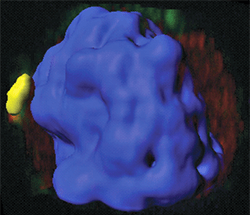Mutational Trigger to Immune Diseases Identified
GTPase of immunity-associated protein 5 (Gimap5) is linked with lymphocyte survival, immune homeostasis, and (auto)immune disease. Gimap proteins are predominantly expressed in lymphocytes and regulate lymphocyte survival during development, selection, and homeostasis. Specifically, polymorphisms in human GIMAP5 are associated with increased risk of islet autoimmunity in type 1 diabetes (T1D), systemic lupus erythematosus (SLE), and asthma.
Members of this family share a GTP-binding AIG1 homology domain and seem to be localized to different subcellular compartments, with Gimap5 localizing in multivesicular bodies (MVB) and lysosomes. Overall, a function for Gimaps in maintaining T cell homeostasis is not clearly defined.

Now, an international group of scientists have discovered how a gene mutation affects T cell function to promote immune
disorders and then tested a treatment based on the discovery—successfully fixing donated immune cells from a 16-year-old boy with an abnormally low level of white blood cells called lymphopenia.“Our data suggest GSK3 inhibitors will improve T-cell survival and function and may prevent or correct immune-related disorders in people with Gimap5 loss-of-function mutations,” said Dr. Hoebe, Ph.D., who is at the division of immunobiology. “Therapeutically targeting this pathway may be relevant for treating people with Gimap5 mutations linked to autoimmunity in type 1 diabetes (T1D), systemic lupus erythematosus (SLE), or asthma.”
Immune system disorders lead to abnormally low immune activity (deficiency) or overactivity (autoimmunity). Immune deficiency diseases decrease the body’s ability to fight infection, while autoimmunity prompts the body to attack its own tissues. Both are common causes of illness, and malfunctioning T cells are linked to both.
Despite the critical role of Gimap5 in immune cell function, the mechanism(s) underlying its activity haven’t yet been identified. The Cincinnati team has now shown that Gimap5 is a critical inhibitor of GSK3β in both human and mouse CD4+ cells.
If GSK3 isn’t inactivated—due to lack of Gimap5 function—it causes DNA damage in expanding T cells, which affects T-cell function and survival. The researchers’ studies showed that targeting GSK3β in the T cells of Gimap5-deficient mice led to improved T-cell survival, prevented liver damage and the development of colitis.
“Our studies reveal a key role for Gimap5 in inactivating GSK3β during CD4+ T cell activation, a link that is critically required to maintain T cell fitness and allows for productive T cell proliferation. We propose that the Gimap5- mediated inactivation of GSK3β is an essential molecular mechanism to support productive CD4+ T cell responses.” They claim that their results point to a “remarkable therapeutic potential” for the use of GSK3 inhibitors to improve CD4+ T-cell survival and proliferation and to prevent immunopathology.
GSK3 inhibitors have already been used to treat disease, including Alzheimer’s disease, mood disorder, cancer, and diabetes mellitis, they note. “Our current data reveal a new therapeutic application of GSK3 inhibitors specifically in the treatment of immunodeficient patients that have GIMAP5 LOF [loss of function] mutations.…We posit that GSK3-inhibitors will improve overall T-cell survival and function and may prevent/correct immune- associated sequelae observed in these patients.”
The researchers acknowledge that further research will be needed before their findings can be translated into the clinic. Nevertheless, Hoebe says, “We believe the use of GSK3 inhibitors to prevent or correct these type of immune-related diseases holds great potential.“





























